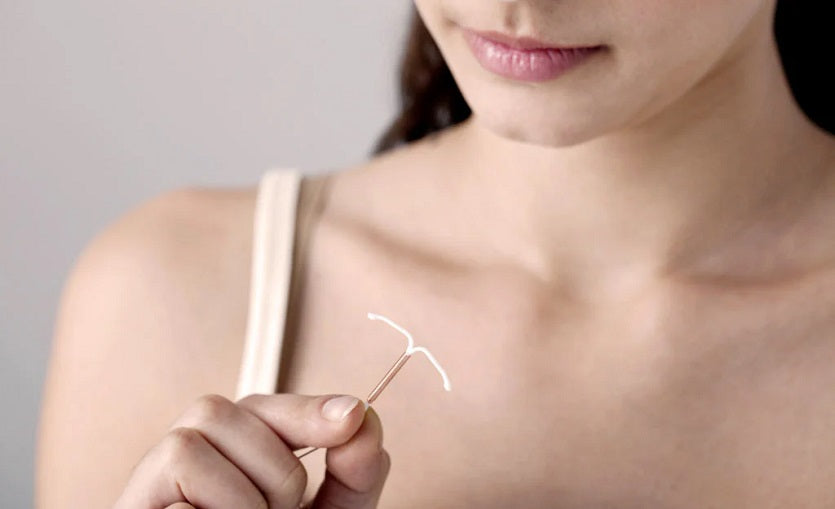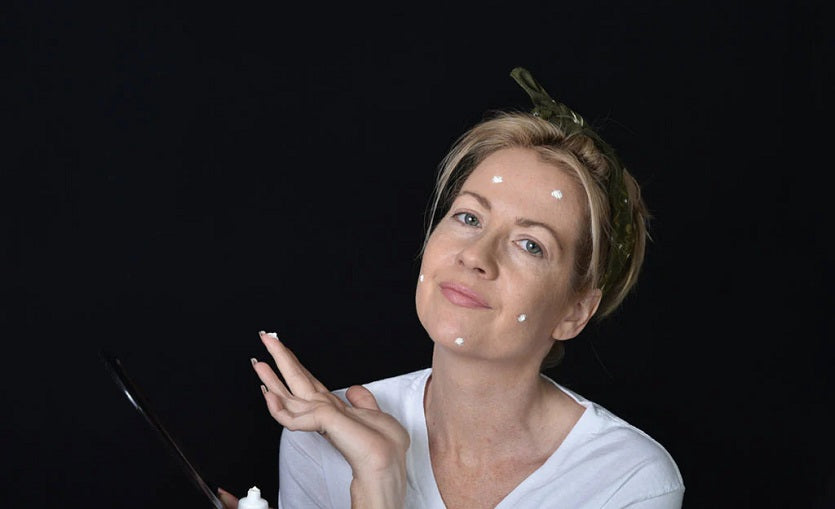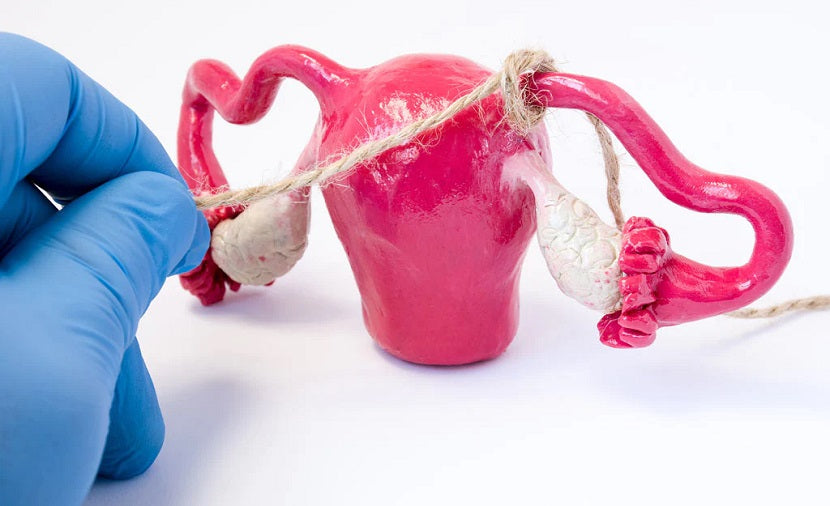Potential Dangers of a Hormonal IUD?
By Jeff Butterworth

It's a controversial topic and many women have polar opinions and get quite emotional about their choices to have a hormonal IUD or not.
This article is not about passing judgment on anyone, but to make ladies aware of the possible dangers, as they are very real and often not fully explained.
Even worse, many women don't realise their symptoms are associated with the device. Please read this article carefully as I will outline many possibilities that are often not recognised.
Clinically, I have seen the downside of these devices, and I believe women are not being sufficiently informed about the consequences. And these are just the known ones. Many doctors and women don't understand the secondary consequences of these devices on the endocrine system and beyond.

Permanent pregnancy
The first thing to understand is that although the amount of progesterone from hormonal IUDs is low compared to the contraceptive pill, the effect is large.
Hormone levels in the blood are very different from the tissue amount in the uterus, but the influence is the same.
The direct signalling from the progesterone impacts on the larger endocrine control, as it identifies a large amount of progesterone in the uterus. This inhibits the natural body process of a menstrual cycle; and tricks the body into believing it's pregnant, hence the reduction in periods for most women.
So don't be misled into believing it's safer because the level of progesterone is lower.
Inhibition of a natural cycle
By inhibiting the period, you block a vital natural route for women to detoxify each month.
Hormonal IUDs may remove the symptoms of a monthly period; however, it's like blocking up a drain. If the body can't release these toxins and cleanse the uterus, it's a very dangerous game to play, and the medical community doesn't recognise this factor.
Once the body cannot cleanse itself regularly, toxins accumulate, blood flow is reduced, and a myriad of symptoms start to occur as a result - such as weight gain, feeling sluggish and tired, depression, and anxiety, to name a few.
Don't let anyone tell you that not having a period is safe. Treat the cause of your symptoms first, and there is no need to block a period.
Treating hormonal imbalances with hormones
Very few integrated practitioners, let alone mainstream GPs or gynaecologists, understand the deep impact of using hormones to treat hormonal imbalances.
Simply by giving the body a hormone, it should be producing, it then reduces the production of that hormone itself. i.e., giving progesterone in hormonal IUDs then turns off your own production of progesterone. There are several flow-on effects from this mechanism controlled by your hypothalamus/pituitary axis in the brain, which controls hormone levels.
The main effect is that oestrogen then becomes unopposed by natural progesterone. This leads to a very common condition called oestrogen dominance, mainly seen in women 30+; however, it can occur at any age.
The epidemic of peri-menopausal women who all tend to suffer from oestrogen dominance is a testament to this.
Then, once you reach menopause, the body has a reduced ability to manufacture its own hormones, hence the epidemic of menopausal symptoms. Here is an article on Oestrogen Dominance.
Slow drip hormones
Now , you have to consider the slow drip feeding of synthetic hormones into the body. The long-term impact of these hormones on the liver and endocrine system are not considered. The thyroid reduces function; blood sugar levels are affected, causing binge eating and sugar cravings; fatigue sets in as the adrenals reduce their output. Adrenal fatigue is becoming more and more common with progesterone creams, and hormonal IUDs are one of the most common causes.
The master endocrine controlling gland - the pituitary - receives false messages about hormone levels, so it adjusts the body's own natural production, leading to further imbalances.

Some women don't understand that weight gain, fatigue, depression, mood swings, anxiety, migraines, and skin breakouts are all coming from the IUD and think that because they no longer get painful periods, everything is fine.
Hormones need to fluctuate, and a blanket dose for 5 years - as in hormonal IUDs, isn't natural and sends your natural cycles into disarray.
Disturbed sleep can be a typical cycle that gets disrupted. However, there are hundreds of cycles in a woman's body that are linked to her menstrual cycle, which can be disturbed. And, of course, none of these is ever linked.
Depletion of nutrients
Ironically, the very nutrients needed for hormone metabolism are the ones depleted by synthetic hormones: Zinc, B vitamins, Chromium, Magnesium, and even Calcium. All these nutrients are known to be depleted by synthetic hormones and are needed for the correct breakdown of hormones. Eventually, the level of circulating hormones is elevated and leaves women wide open for the development of oestrogen dominance and hormone-dependent cancers.
Emotional link
Finally, and hard to quantify, is the emotional link to the imbalanced hormone levels. It's impossible to test for via blood or even saliva because hormone levels are normal, but are shifting erratically - which leads to mood swings, anxiety, and depression with antidepressants the first treatment option for what essentially is a hormonal imbalance linked to the hormonal IUD. Here is an article on Depression linked to hormonal imbalance for your interest.
Legal issues
The common hormonal IUD has become big business for law firms in the U.S., as class action suits are taken against the manufacturer.
I am more concerned about the silently hidden effects of many women who happily comment that they have not had any problems with the IUD - yet are on anti-depressants, thyroid medication, can't lose weight - and don't link it back to the common cause.
A quick Google of hormonal IUDs will bring up countless stories about the devices, yet it seems to be the first treatment choice for doctors.
We see thousands of comments about how hormonal IUDs have been the worst thing women have ever done for their bodies. In defence, there seems to be an equal amount of women who testify to have no issues.
My point is to look deeper - as often, there are underlying health issues that may never have been linked. There are just too many women commenting about the impact on their lives, not to take it seriously.
In my opinion, hormonal IUDs need an independent enquiry into their safety rather than relying on pharmaceutical research and doctor-reporting of adverse reactions.

Treat the cause, not the symptoms
Unfortunately, it's an all too common story for women from a supposedly simple treatment option. In fact, hormonal IUDs have become a first-line treatment option when it should be the last.
Focusing on the larger endocrine imbalance that is the root cause of the problem allows everything to fall into place, and women can lead a happy, healthy life rather than being stuck in a mire of emotional and physical symptoms.
Think seriously about the real and hidden consequences of a hormonal IUD. I do not have any alternative motive in pointing out problems with hormonal IUDs. It's just that I have seen too many, to remain quiet.
Summary
Share this post to help build awareness of hormonal imbalances, so that other women can find natural solutions.

REFERENCES
Hoggart, L.,& Newton, VL. Young women’s experiences of side-effects from contraceptive implants: a challenge to bodily control. Reproductive Health Matters. 2013. May;21(41):196-204.
https://doi.org/10.1016/s0968-8080(13)41688-9
Sun, X., Xue, M., Deng, X. et al. Clinical characteristic and intraoperative findings of uterine perforation patients in using of intrauterine devices (IUDs). Gynecological Surgery. 2018; 15, 3.
https://doi.org/10.1186/s10397-017-1032-2
Rowlands, S., Oloto, E., & Horwell, D. H. Intrauterine devices and risk of uterine perforation: current perspectives. Open access journal of contraception. 2016; 7, 19–32.
https://doi.org/10.2147/OAJC.S85546






Leave a comment
This site is protected by hCaptcha and the hCaptcha Privacy Policy and Terms of Service apply.